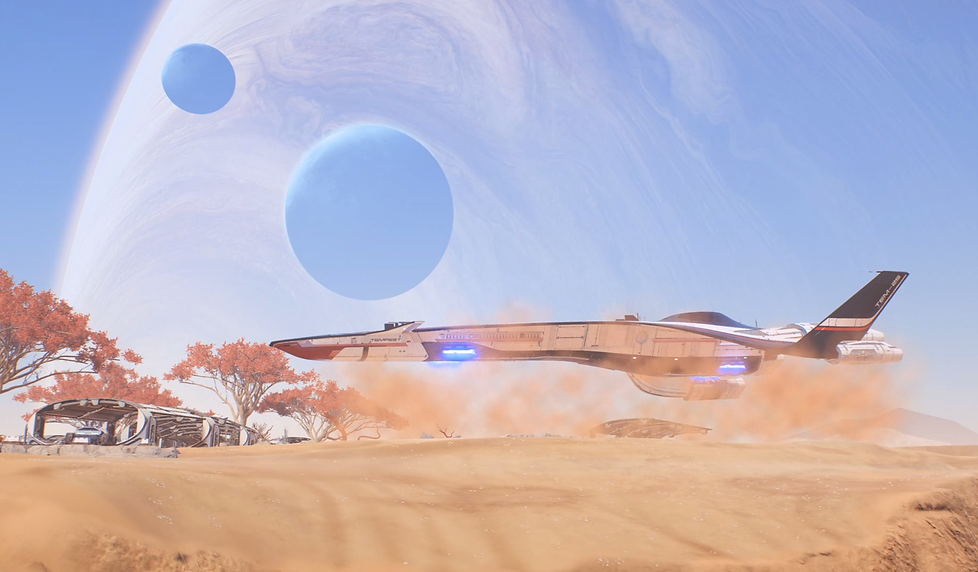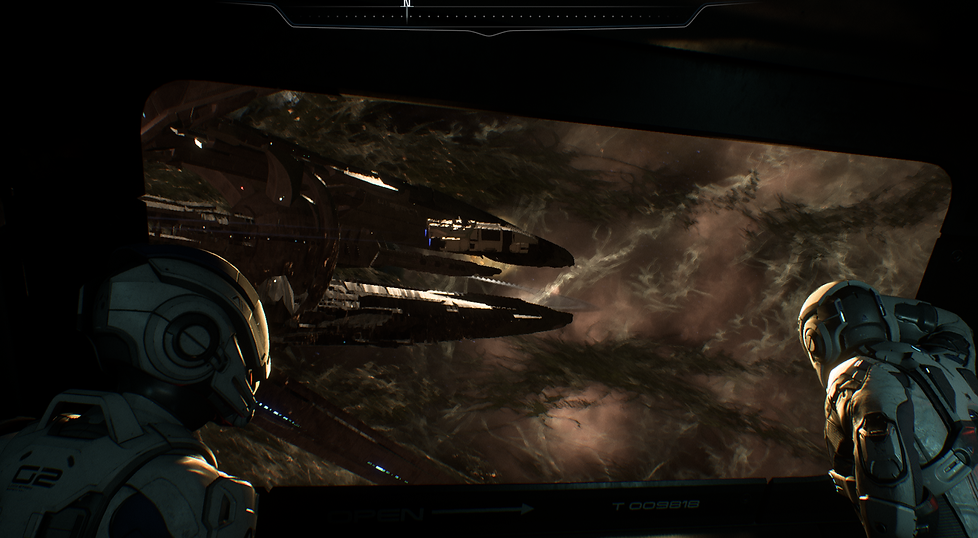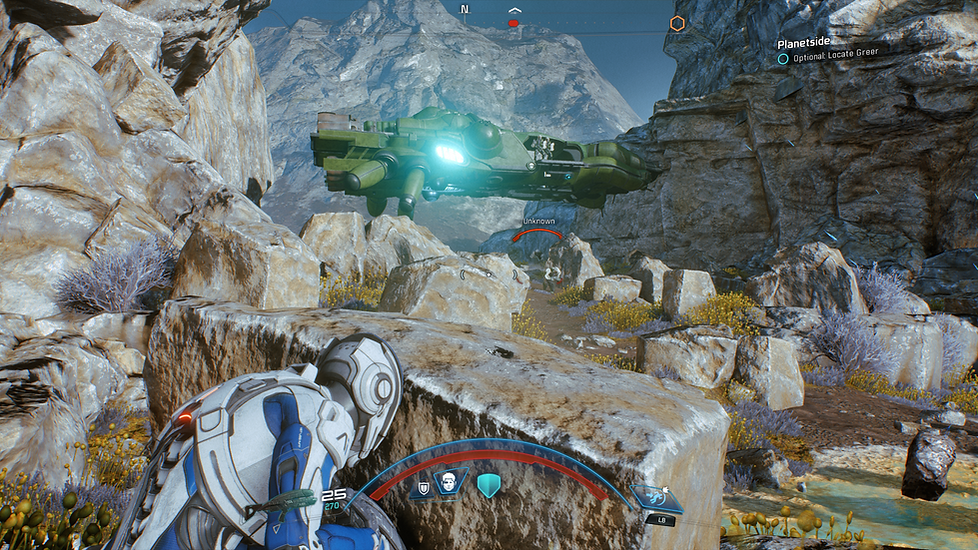
Mass Effect: Andromeda - Review
Mass Effect has been a series dear to my heart since I played the first entry almost a decade ago. That original trilogy captivated a generation of players with a science-fiction universe into which BioWare wove a spellbinding tale of heroism that sought to answer some of the very fundamental questions of human existence. The trilogy ended on a note that left an entire Milky Way galaxy irrevocably changed – the kind of ending upon with it is difficult, if not impossible, to continue. To that circumvent that finality, Mass Effect: Andromeda sends players on a mission to colonize a completely different galaxy.
Having left years before the conclusion of Mass Effect 3, several arks house the primary sentient species that inhabited the Milky Way. Those familiar races, the humans, asari, turians, salarians, and krogan, spent six hundred years in stasis pods to reach the Andromeda galaxy. This journey promised a fresh start for those who embarked upon it. The Initiative, the organization behind the resettlement, launched the Nexus, a gigantic space station that would serve as a new galactic hub, around the same time as the ark ships. Several “golden worlds” had been identified, prime targets for habitation for the various settling species. Everything was planned to the letter.
Except very few things ever go according to plan.
Really, that above sentence could apply broadly to Mass Effect: Andromeda, not just the story. No doubt most people reading this review will be familiar with the facial animation issues in Andromeda. While those animation woes are by no means small, the extreme focus on them has eclipsed a lot of the discussion regarding the more interesting problems that plague Mass Effect: Andromeda.
When I think back on my time with BioWare’s latest attempt as a space epic, I remember all the time I spent on sprawling planets that initially held a certain thrill of discovery. I was an explorer! These were planets in a new and unknown galaxy! Who knows what kinds of crazy lifeforms or interesting encounters might be around any given turn of the terrain? Heck, BioWare even resurrected a planet roving vehicle and improved its handling to hark back to the original Mass Effect and its Mako tank. As I delved deeper and deeper into Andromeda, the game begin to feel routine. Why?
Part of what contributed to the mundane atmosphere that pervades Mass Effect: Andromeda can be traced to the waste of its own fundamental premise. Players were on an adventure to an entirely unknown galaxy, a situation prime for introducing truly alien encounters. Instead of expanding the Mass Effect universe in interesting ways, players simply find more of the same stuff. BioWare took a creative approach to write themselves out of the corner they had created with Mass Effect 3, but chose to ignore many of the interesting elements that their solution would entail in order to bring everything back to some arbitrary status quo.

Instead of encountering novel beings that would arise from a galaxy free from the cycle of destruction within the Milky Way, the two new sentient races encountered in Andromeda are humanoid with immediately relatable wants and desires. The main quirk of the angaran? They are more communal and open with their emotions. The main quirk of the kett? They have a rigid theocratic hierarchy based around genetics. We’re in a new galaxy in a rich sci-fi universe where the creatures we encounter could be anything: sentient energy crystals, renegade swarms of nanites that have achieved a hivemind, mouse-sized silicon creatures whose ways are completely incomprehensible. Literally anything could exist in a galaxy so far removed from any kind of interaction with the galaxy BioWare crafted in the first three games. Those interesting possibilities are shoved aside in favor of more familiar and “relatable” allies and villains.
In fact, this desire to return to the pre-Mass Effect 3 status quo in a new galaxy even extends to some of the most thought provoking questions of encountering alien species. The most important part of first contact involves figuring out how to communicate. Entire films have been based around that premise *cough* Arrival *cough*. Even Star Trek: The Next Generation took an hour for Picard to figure out how a new alien species communicated. You could take it for granted in the trilogy that humans had figured out communications with the aliens of Citadel space decades previously, so it wasn’t an issue. Mass Effect: Andromeda spends not even five minutes on that subject with either of its new additions to their galactic cast of character species.
Not only that, but the entire sense of scale, the stakes, and the urgency at play is skewed. If things go wrong with the ark ships, the entire initiative could fail. Even ground-level, no-name NPCs don’t seem too concerned, despite their desperate circumstances that present a threat to their survival. In one side mission, Ryder encounters two human pot heads living in the middle of nowhere on a planet where the water is so toxic it is literally on fire. The duo should be in the perfect position to know how monumentally screwed the Initiative’s future is, but they simply don’t care – an attitude reflected in how most NPCs react to deadly danger in Andromeda.

Here’s an example: One of the primary locations in Mass Effect: Andromeda is an ice planet called Voeld. It’s one of the worlds controlled by the angara, but the player is told that it has become the front line in the war against the kett. When players land and begin exploring Voeld, the planet presents absolutely no evidence of any kind of protracted war. There are some scattered bases, some ships overhead on occasion, but nothing resembling an ongoing war. Heck, there aren’t even any craters to be seen. We know from Mass Effect 3 what a war in Mass Effect’s universe looks like. Palavin was a colossal battleground between the Reapers and the turians. Soldiers were breathless, tired from combat and wiped out emotionally. They did everything and anything they could to hold the line against an overwhelming adversary. Voeld has none of that. They even have entire towns – one of which has a hotel. They have scientists traipsing around researching animals beneath the ice or old ruins. The kett, supposedly an existential threat to the angaran people, seem at worst a nuisance.
Very few characters act appropriately to the situations in which they find themselves. Most almost always go for a glib one-liner on par with Batman Forever’s Mr. Freeze, “Ice to meet you.” Arrived at what should be the sparkling hub of your new civilization only to find that it seems partially derelict? Time for a quip! Wandering in the belly of a completely unknown alien civilization’s living ruin? Time to just randomly activate things because you think you know what they do! Side note: Just once I want to see Ryder or their allies activate one of these alien devices only to find out it starts a giant alien weapon made to warp the planet into a star or some nonsense. They literally have no idea what these devices do, just their best guess and a human created AI that also is just making educated guesses.
Then we get to the actual exploration, supposedly the core of Mass Effect: Andromeda. Very little exploration goes on. There are several huge maps covered with constantly respawning camps of enemies that stand between players and objective markers. The missions encountered in the wild rarely become anything more complicated than a fetch quest to get a thing from some bad guys. Sometimes pleasant surprises lurk at the end of seemingly boring quests, like gigantic robot boss battles, but often these grunt work tasks reward the player with habitability points. These points act as a kind of gating mechanism for upgrades, similar to the points used on the world map in Dragon Age: Inquisition. Outside of that, they don’t feel that impactful or important. Even raising planet habitability to 100% feels pointless. The settlements remain the same, some marginal rewards increase, but other than that there never felt like a compelling reason for anyone to bother unless they are a completionist.
I’d like to contrast this approach with the original Mass Effect. While the first Mass Effect game certainly had problems, there was genuinely a sense of adventure. Every planet scanned might lead to something unique, like an ancient alien ruin or a collective of terrorists or rogue scientists whose experiment has gone awry. These sequences also had large, open maps that were filled with a lot of nothing and filler enemies, but enough was done to the planets to make them feel distinct and many of the encounters, though reusing assets, were written well enough to be interesting and involved player choice.

None of that random exploration is present in Andromeda. I scanned every planet and found not a single unique situation or hidden adventure, only resources for crafting.
That crafting system that BioWare touted in the lead up to Andromeda’s release? Unfortunately, it rarely feels impactful. I used weapons I picked up and they worked fine. I crafted weapons a handful of times and they also worked fine in slightly different ways. Most of the time the only things I was excited to craft for Ryder were improvements to the roving tank to improve its speed or boosters.
For the most part, Andromeda’s supporting cast manage to provide endearing personalities. Drack as a krogan grandpa and Vetra’s lady-turian smuggler were fun additions to the crew, but on there aren’t any Garrus Vakarians or Tali’Zorah vas Normandys to really latch onto as standout characters. That’s something BioWare could build toward over time with sequels, but I didn’t feel any particularly strong connections with most of the characters in this first outing.
The disconnect between the player and various characters in Andromeda largely boils down to the amount of inconsequential fluff that pads out Andromeda. There’s so much busywork with so little pay-off that players lose track of what makes the cast fun or special. There was a 15+ hour long period in my playtime where I was just bored with what I was doing. Oh no, a scientist put her thesis on a hard drive that was stolen by bandits. Time to drive to the middle of nowhere to kill them and get it back (and the solution is almost always kill some ambiguous “them”). Missions like this exist in abundance throughout Andromeda – little to no interesting character interactions, just straightforward affairs that have players going around the same big environments. When the worlds open up, players naturally invest themselves in the various activities thinking that there might be an interesting moment or pay off to any of it… but there isn’t. Instead, players start to forget what they’re even supposed to be doing or care about. The narrative loses its propulsion.
Trudging through the motions of establishing colonies and checking off the soon routine alien ruins spread across planets while dealing with disgruntled colonists- it all becomes work. All of this should be fun – we’re using cutting-edge technology to forge a new home on planets full of alien technology and life forms we have never seen before.


The first beat of life after the exciting introductory sequence occurred over a dozen hours later when I was able to take on companion missions. It felt like things were happening! I got to see characters interacting with each other! Some well-written scenarios that made me laugh or excited! Liam’s side mission in particular felt like such a welcome breath of fresh air it almost seemed like it was from a different game. When Andromeda leans into those more linear segments and allows its characters to be themselves with Ryder or other companions, it really shines.
Remember the action button prompts that would frequently pop up in Mass Effect 2 and 3? The ones that allowed extreme actions to be taken during dialogue sequences? Those are so rare that I could count with one hand the number I saw in a full playthrough. It got to the point that I just pressed it excitedly when it popped up without really knowing what was going to happen and at least on one occasion that resulted in a character’s death. While ditching the Paragon and Renegade system of years past seemed like a necessary update, it also eliminated the short hand players could use to predict what kind of an outcome pressing the action prompt might have in Andromeda.
Combat stands out as the most solid aspect of Mass Effect: Andromeda. This is the smoothest and most action-filled BioWare game to date and it just feels good to take down enemies. On top of that, the new jump and boost mechanics give combat a whole new degree of mobility that it never had before. It feels free and fluid, providing players with more options in a fight than ever before. The responsive gunplay and interesting abilities really come to the forefront, making it easy to sink a lot of time into the less interesting parts of the game just to discover the perfect combination of abilities.

The smooth combat translates into an enjoyable multiplayer experience who enjoy the gameplay on its own. Players accomplish a variety of objectives around various maps before escaping in shuttle craft. Succeeding in these missions allows players to level their multiplayer character and unlock new weapons and abilities for that character. Some rewards also carry over into the single-player campaign. It's a solid experience, but I'm not entirely sure how much longevity it has for players who have had their fill of fighting from the core game.
Unfortunately, the combat stumbles when it comes to progression in Mass Effect: Andromeda's campaign. Players begin by choosing specialties, but can decide to respec their ability points at any time from their ship or simply use points from new levels to unlock abilities outside of their beginning specialties. Only a handful of those abilities are gated to certain levels, meaning that most abilities are available from the start. This all sounds great, but the problem comes in when players discover their preferred play style and abilities. When that happens, the motivation to experiment comes to an end. Upgrading those abilities simply makes them more effective, but doesn’t change the player’s approach to gameplay. This leads to gameplay becoming stale toward the end of a prolonged playthrough, which is hardly ideal.
All of this doesn’t even touch on the various glitches that can plague Mass Effect: Andromeda. These manifest in a number of ways. Sometimes the game randomly crashes. Other times NPCs duplicate themselves. This can happen during conversations and can be really jarring. Sometimes NPCs get stuck in world objects. Notably, a random NPC on the Nexus space station would stand still on a stage staring straight ahead. She unnervingly persisted throughout my entire playthrough. Enemies in the respawning zones around the various worlds sometimes just float in the air. Sometimes characters simply disappear from cutscenes or fuse with other characters to create horrifying chimeras.
Note: A recent patch weeks after release managed to fix the bizarrely dead and distracting eyes that often appeared to be locked into a look of fear or surprise. That patch doesn’t fix some of the other issues most of the faces in Andromeda seem to have with emoting, though. Some characters have certain resting faces that make them look like they are perpetually smiling, regardless of the situation. This issue is particularly noticeable with certain versions of female Ryder or her ally Cora. Also, and this is really not important, but female angaran character models look like they weren’t finished. Compare them to male angaran faces and they seem to lack a lot of detail or defining features.
Conclusion:
Mass Effect: Andromeda has the potential to be built into something great, but that potential is buried under a pile of issues that range from structural to technical. These problems range in scale from insignificant to huge. That this game launched without a fix for something as basic as the patch that fixed how eyes looked is incredible. Combat manages to top that of its predecessors, but becomes mired when it comes to progression. The visual presentation of the various planets at times reaches awe-inspiring heights, but gets brought low by the facial animations and persistent glitches. The potential of a new galaxy stretches out for players to explore and define, but that promise gets squandered in a number of disappointing ways. All of that being said, Mass Effect: Andromeda succeeds in laying a foundation on which sequels could successfully build. This outing might not live up to the series’ roots, but the possibility remains open for the entries that are sure to come.
The Breakdown
Concept:
Art Design:
Sound:
Playability:
Replay Value:
Is It Fun?:
Recommended For:
Keep alliances intact while exploring a new galaxy
Gorgeous (when everything is working correctly)
Andromeda lacks a memorable score
The combat is the best that Mass Effect has ever felt
Low
Like Inquisition, it depends on where you invest your time
The people passionate about sci-fi and narrative-heavy games
Mass Effect: Andromeda is now available for PlayStation 4, Xbox One, and PC
Review originally appeared on www.extra-life.org 04/28/17



